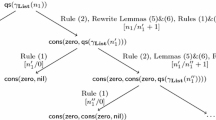Abstract
This paper builds on recent efforts (Hirokawa and Moser, 2008) to exploit the dependency pair method for verifying feasible, i.e., polynomial runtime complexities of term rewrite systems automatically. We extend our earlier results by revisiting dependency graphs in the context of complexity analysis. The obtained new results are easy to implement and considerably extend the analytic power of our existing methods. The gain in power is even more significant when compared to existing methods that directly, i.e., without the use of transformations, induce feasible runtime complexities. We provide ample numerical data for assessing the viability of the method.
This research is partly supported by FWF (Austrian Science Fund) project P20133, Grant-in-Aid for Young Scientists 20800022 of the Ministry of Education, Culture, Sports, Science and Technology of Japan, and STARC.
Preview
Unable to display preview. Download preview PDF.
Similar content being viewed by others
References
Hirokawa, N., Moser, G.: Automated complexity analysis based on the dependency pair method. In: Armando, A., Baumgartner, P., Dowek, G. (eds.) IJCAR 2008. LNCS, vol. 5195, pp. 364–379. Springer, Heidelberg (2008)
Lescanne, P.: Termination of rewrite systems by elementary interpretations. Formal Aspects of Computing 7(1), 77–90 (1995)
Bonfante, G., Cichon, A., Marion, J.Y., Touzet, H.: Algorithms with polynomial interpretation termination proof. JFP 11(1), 33–53 (2001)
Avanzini, M., Moser, G.: Complexity analysis by rewriting. In: Garrigue, J., Hermenegildo, M.V. (eds.) FLOPS 2008. LNCS, vol. 4989, pp. 130–146. Springer, Heidelberg (2008)
Arts, T., Giesl, J.: Termination of term rewriting using dependency pairs. TCS 236, 133–178 (2000)
Arts, T., Giesl, J.: A collection of examples for termination of term rewriting using dependency pairs. Technical Report AIB-2001-09, RWTH Aachen (2001)
Giesl, J., Arts, T., Ohlebusch, E.: Modular termination proofs for rewriting using dependency pairs. JSC 34(1), 21–58 (2002)
Hirokawa, N., Middeldorp, A.: Tyrolean termination tool: Techniques and features. IC 205, 474–511 (2007)
Giesl, J., Thiemann, R., Schneider-Kamp, P., Falke, S.: Mechanizing and improving dependency pairs. JAR 37(3), 155–203 (2006)
Baader, F., Nipkow, T.: Term Rewriting and All That. Cambridge University Press, Cambridge (1998)
Terese: Term Rewriting Systems. Cambridge Tracts in Theoretical Computer Science, vol. 55. Cambridge University Press, Cambridge (2003)
Hofbauer, D., Lautemann, C.: Termination proofs and the length of derivations. In: Dershowitz, N. (ed.) RTA 1989. LNCS, vol. 355, pp. 167–177. Springer, Heidelberg (1989)
Contejean, E., Marché, C., Tomás, A.P., Urbain, X.: Mechanically proving termination using polynomial interpretations. JAR 34(4), 325–363 (2005)
Giesl, J., Thiemann, R., Schneider-Kamp, P.: Proving and disproving termination of higher-order functions. In: Gramlich, B. (ed.) FroCos 2005. LNCS (LNAI), vol. 3717, pp. 216–231. Springer, Heidelberg (2005)
Hirokawa, N., Middeldorp, A.: Automating the dependency pair method. IC 199(1,2), 172–199 (2005)
Fuhs, C., Giesl, J., Middeldorp, A., Schneider-Kamp, P., Thiemann, R., Zankl, H.: SAT solving for termination analysis with polynomial interpretations. In: Marques-Silva, J., Sakallah, K.A. (eds.) SAT 2007. LNCS, vol. 4501, pp. 340–354. Springer, Heidelberg (2007)
Author information
Authors and Affiliations
Editor information
Editors and Affiliations
Rights and permissions
Copyright information
© 2008 Springer-Verlag Berlin Heidelberg
About this paper
Cite this paper
Hirokawa, N., Moser, G. (2008). Complexity, Graphs, and the Dependency Pair Method. In: Cervesato, I., Veith, H., Voronkov, A. (eds) Logic for Programming, Artificial Intelligence, and Reasoning. LPAR 2008. Lecture Notes in Computer Science(), vol 5330. Springer, Berlin, Heidelberg. https://doi.org/10.1007/978-3-540-89439-1_45
Download citation
DOI: https://doi.org/10.1007/978-3-540-89439-1_45
Publisher Name: Springer, Berlin, Heidelberg
Print ISBN: 978-3-540-89438-4
Online ISBN: 978-3-540-89439-1
eBook Packages: Computer ScienceComputer Science (R0)




